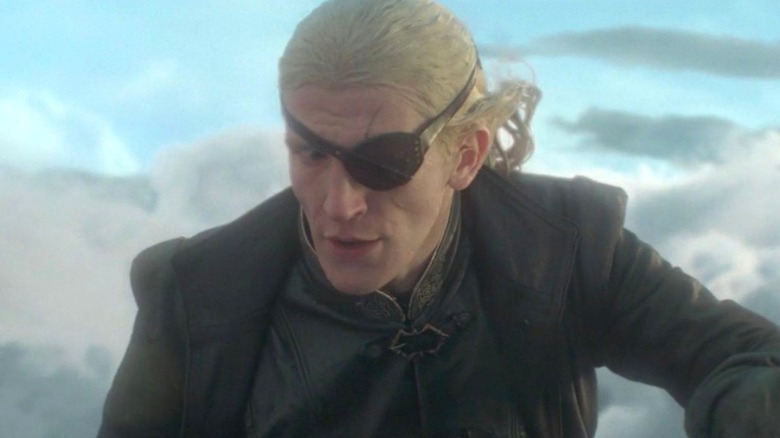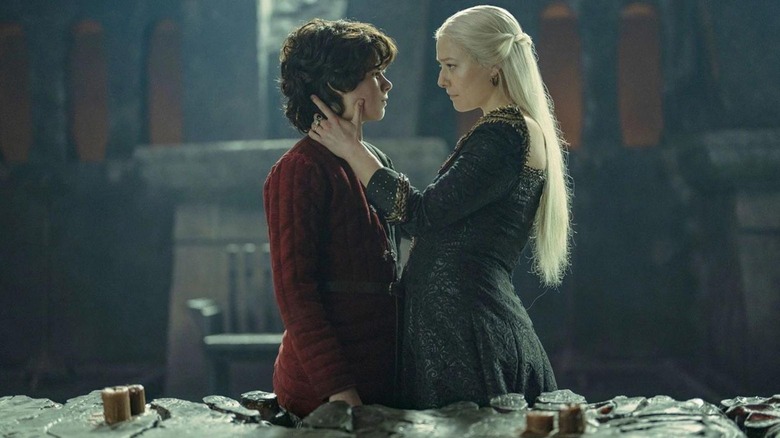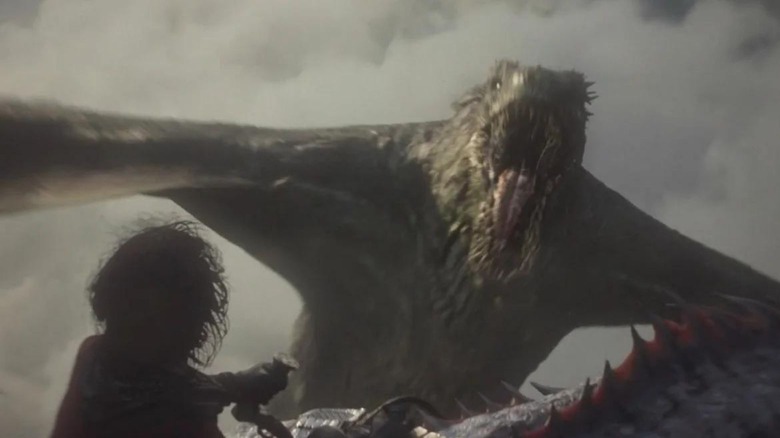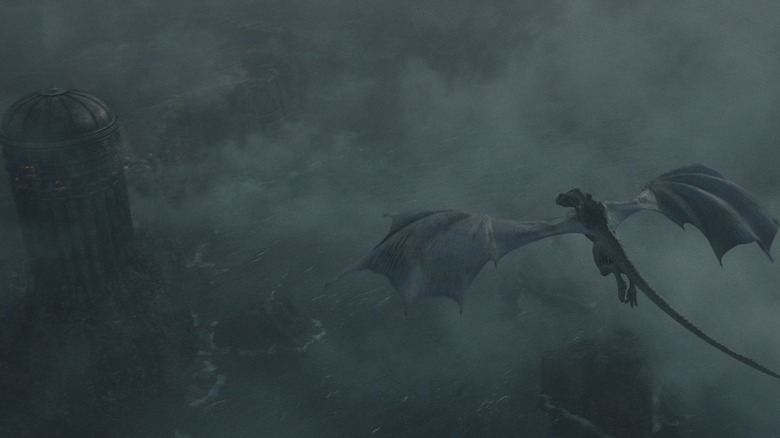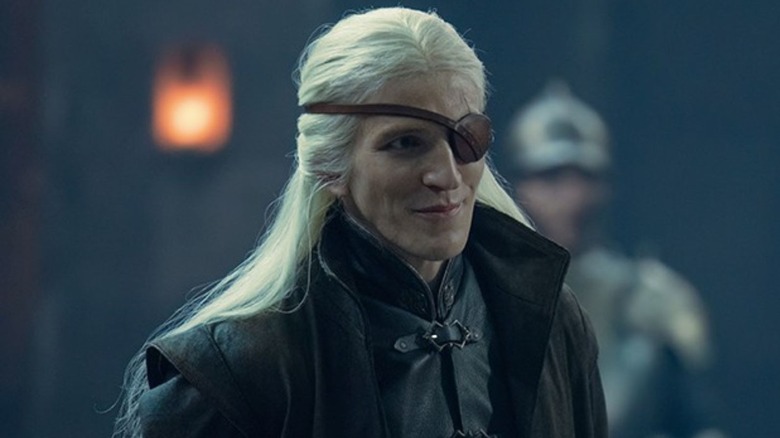How House Of The Dragon's Biggest Change From The Book Improves The Show
This post contains spoilers for the "House of the Dragon" finale.
"House of the Dragon" has made quite a few changes from its source material, "Fire & Blood." George R.R. Martin's book lacks singular character perspectives and only reveals an outsider's experience of events that led to the division and eventual fall of House Targaryen. Understandably, "House of the Dragon" co-showrunners Ryan Condal and Miguel Sapochnik needed to make some changes to facilitate nuance and create a complex and gripping narrative that doesn't just feel like a trailer of historical occurrences.
In the penultimate episode of the series, we see how Queen Alicent (Olivia Cooke) misinterprets her dying husband's last words — his desire for Aegon the Conqueror's dream to be taken seriously — as a desire for their son, also named Aegon, to be crowned king. Alicent then becomes complicit in the small council's quest to usurp Rhaenyra's (Emma D'Arcy) throne. While her misunderstanding lays the greater foundation for the Dance of the Dragons to begin, her son Aemond's (Ewan Mitchell) efforts in the finale become the last stroke that causes the House of the Dragon to plunge into war. This event marks the show's biggest, most significant deviation from the books, and while it might appear controversial to certain readers, it is a welcome and necessary change.
A great misunderstanding
"House of the Dragon" depicts the steps leading to the historical event that tore down the Targaryens. During its finale, the show makes one change that reduces the civil war to a devastating misunderstanding.
To quickly recap the events of "Fire & Blood," the tragedy that inspires Rhaenyra to plunge into full-fledged war against the Greens is the murder of her son, Lucerys (Elliot Grihault), and his dragon, Arrax, at the hand of Queen Alicent's son, Aemond, and his dragon, Vhagar. The battle between the two Princes and their Dragons occurs at Storm's End, when both Princes endeavor to win the support of Borros Baratheon for their respective families. Upon meeting Lucerys, Aemond demands his eye as payment for his own and is further antagonized when a girl present at court makes fun of his disability. This, in turn, angers Aemond enough to chase Lucerys on dragonback during a storm. The fight ends with the largest dragon in Westeros (said to be five times the size of her foe) murdering Lucerys and Arrax. In the book, Aemond's murder of Lucerys is deeply intentional. The show, however, paints the scene as an accident.
Ultimately, dragons answer to no one
If there is anything "House of the Dragon" does flawlessly, it is foreshadowing the future. In episode 1, King Viserys (Paddy Considine) tells his young daughter, Rhaenyra (Milly Alcock), that dragons are a power men never should have trifled with. "The idea that we control the dragons is an illusion," he urges his daughter, explaining that if Targaryens didn't mind their history, dragons would bring them their doom as they did Old Valyria. The finale confirms this theory.
We already knew Aemond is a petty prince. He has been raised with hatred in his heart for Rhaenyra and her children, and it doesn't help that they bullied him during his childhood. When Aemond chases after Lucerys in the finale, it is an exceptionally ill-intentioned prank. He wants to terrify Lucerys, who is doing his best to escape. Despite the Valyrian commands and the Princes' hold over their dragons, both suddenly lose control when the beasts act on how their riders are feeling, instead of obeying their orders. Arrax learns that Luke feels threatened, so he disobeys his commands; in self-defense, he breathes fire against Vhagar, who then decides to chomp on them both. Aemond's horror at the brutal, bloody death caused by his losing control of Vhagar is seen on his face — he knows he can never go back from what has happened. He knows his actions will kickstart a war, and any previous restraint shown by the other side is about to end.
For the sake of nuance
It is so profoundly poetic how every pivotal event leading to the Dance of the Dragons is due to a misunderstanding between two sides of an estranged family. It is not that the show's decision to treat Aemond's murder of Luke as an accident strips him of his agency or ambition — it adds a layer of nuance to it. You can hate Aemond all you want, but you cannot disagree that he, too, has complicated emotions and wrestles between what he thinks he should do and what he feels he should do.
Aemond has studied history. He has trained with a sword. His intelligence is undeniable. Allowing his thirst for payback to serve as the first blow in a civil war would contradict his intellect. He's not a sadistic killer who murders in cold blood, and as terrible as his tendency to act on impulses can be, it's clear he's hunting Luke to make him fear for his life while thinking he can hold back. It's when he realizes he cannot control Vhagar that the season comes full circle. It symbolizes how Targaryens cannot fully control their dragons — they are, after all, only beasts who have been (seemingly) tamed.
The Dance of the Dragons is forever changed
The change in Aemond's intention is a big deflection from the source material because now, the Dance of the Dragons will have commenced based on a terrible, tragic accident. Aemond is an inexperienced young boy who was given way too much power when he claimed Vhagar. Dragons are uncontrollable, and making Luke's murder an accident adds intricacy to an otherwise extreme death. It's always more interesting to see antagonists realize the weight of their actions, to witness the shift in expression when they catch themselves off guard, to see them conceal their shock so they may not appear weak. If there's something "House of the Dragon" has proved time and time again, it is that nothing and no character is simply black or white. Everything's grey. And that's what makes it so memorable.
